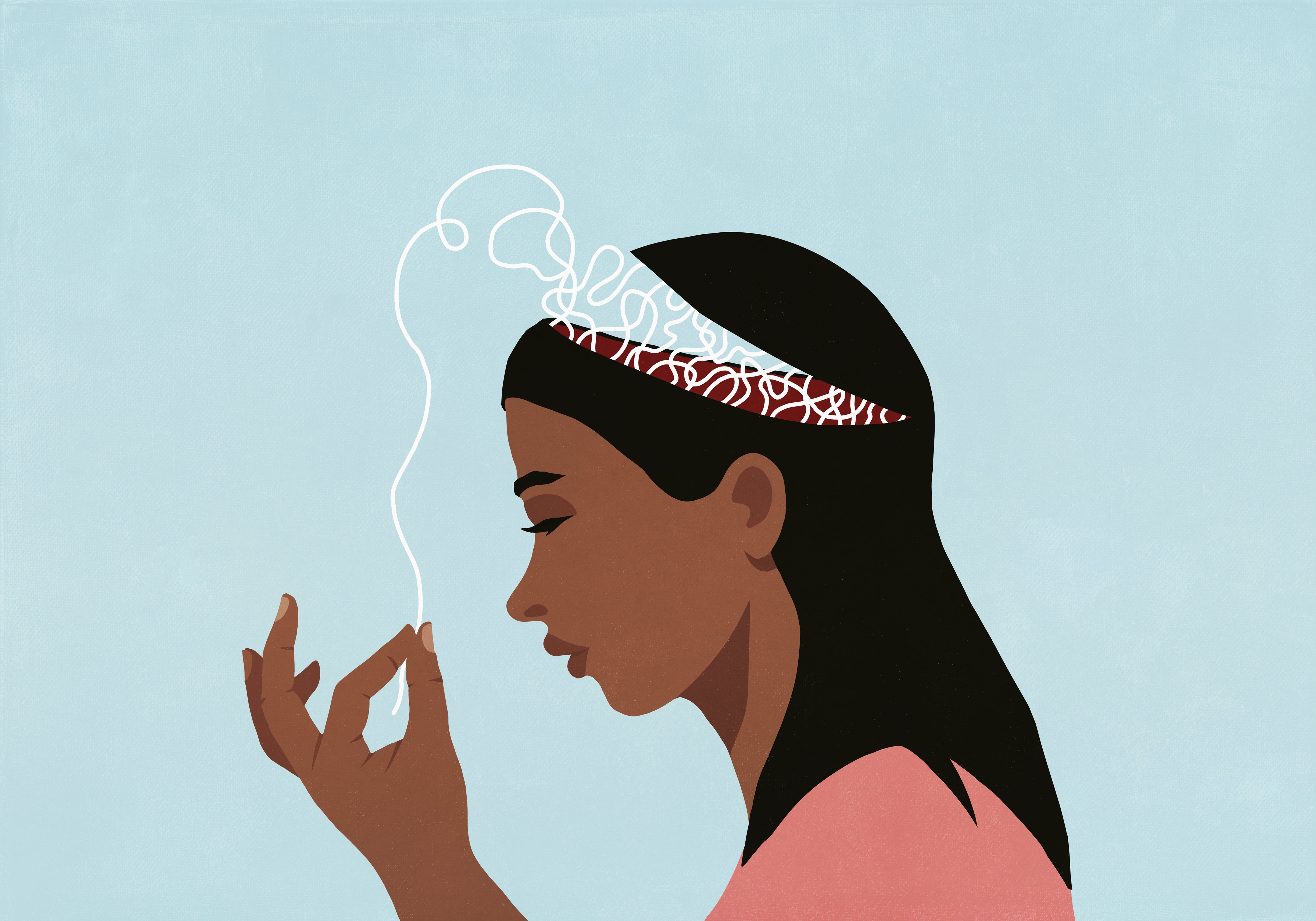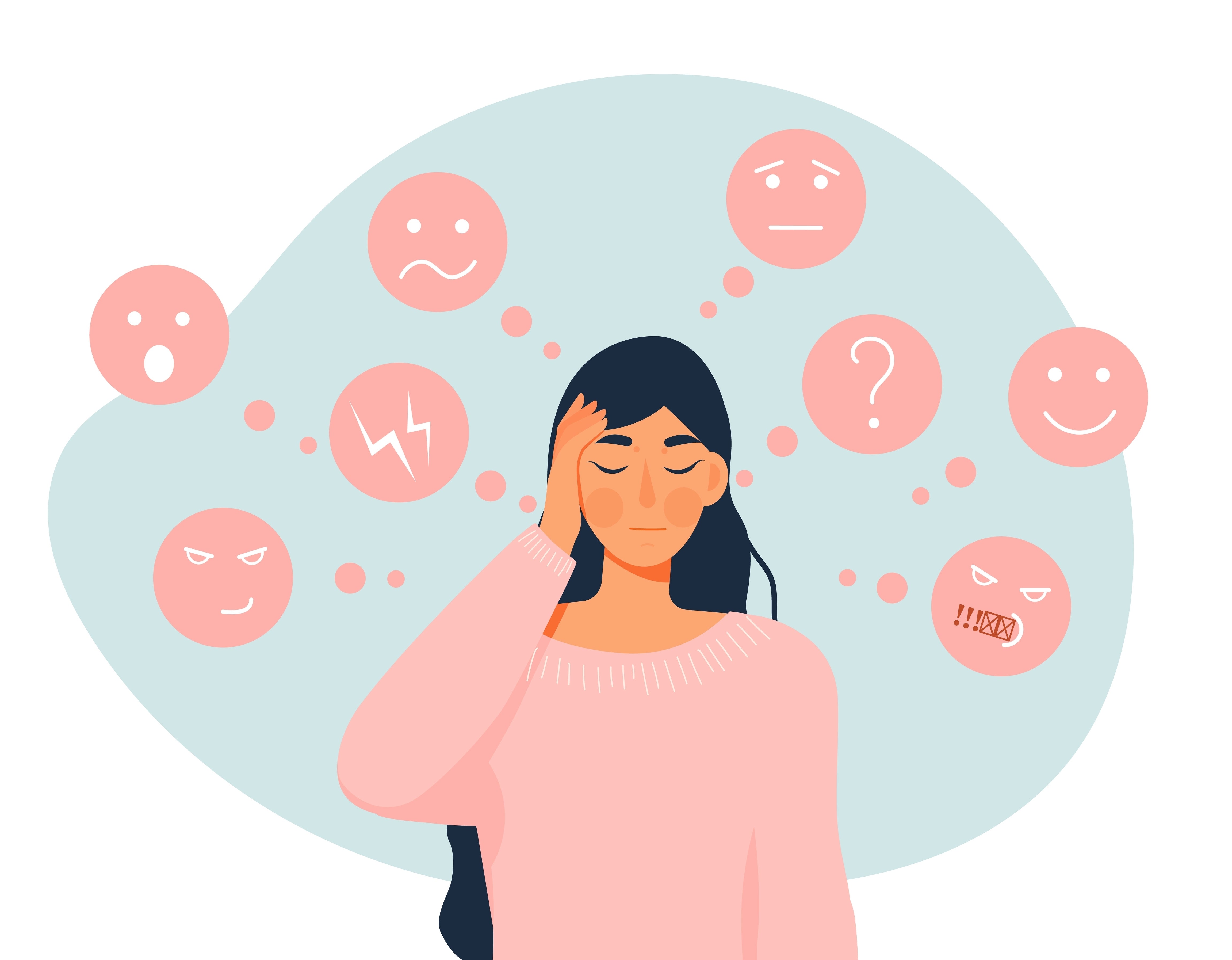‘I thought I was losing my mind’: The hormonal condition that’s destroying women’s mental health
Between two and eight in 100 women suffer from this debilitating hormonal condition, and yet so little is known about it. Olivia Petter shares her experiences


Your support helps us to tell the story
This election is still a dead heat, according to most polls. In a fight with such wafer-thin margins, we need reporters on the ground talking to the people Trump and Harris are courting. Your support allows us to keep sending journalists to the story.
The Independent is trusted by 27 million Americans from across the entire political spectrum every month. Unlike many other quality news outlets, we choose not to lock you out of our reporting and analysis with paywalls. But quality journalism must still be paid for.
Help us keep bring these critical stories to light. Your support makes all the difference.
Every month, there are a handful of days when I feel so desperately sad I can barely leave my house. There have been panic attacks, feelings of hopelessness and suicidal thoughts. It’s something that only started in the last few years, and as such, there has been no shortage of things to attribute it to. Work. Family. Money. Relationships. Health. Contraception. Landlords. Essentially, every sort of life issue that may come up for any one of us has been, at some point, responsible for my monthly bouts of low mental health.
It wasn’t until last year, when I found myself researching another article on women’s health, that I came across PMDD. Premenstrual dysphoric disorder is a severe form of premenstrual syndrome (PMS), which primarily affects your mental health. Affecting between two and eight women out of 100, this hormone-based mood disorder can cause a range of behavioural and emotional symptoms similar to PMS but far, far worse. They range from fatigue, forgetfulness and irritability to anxiety, depression and aggression.
For many, it’s a debilitating condition causing major monthly disruptions to your psychological and physical well-being, with one study concluding that, left untreated, women with PMDD might expect to lose three quality-adjusted life years. But for some, it can prove fatal:one study from 2021 found that women with PMDD are almost seven times at higher risk of suicide attempts. And yet, to this day, very little is known about it.
It wasn’t until 2013 that PMDD was added to the Diagnostic and Statistical Manual of Mental Disorders, a manual used by healthcare professionals globally. In 2019, it was included in the International Classification of Diseases, finally validating PMDD as a legitimate medical diagnosis worldwide. None of this will be surprising to anyone who’s looked into medical misogyny and how a long history of dismissing female medical issues has hindered research, diagnosis, and development. After all, it wasn’t too long ago – 2002 – thatsome clinicians openly questioned whether or not PMDD was even real.

“There is such poor research into many aspects of women’s health and PMDD is no different,” says Gemma Barry, founder of the Well Woman Project and author of Periods Aren’t Meant to Bloody Hurt. “Women have been labelled with hysteria for many hundreds of years, which has led to downplaying a lot of symptoms women experience with their periods and hormones. Our bodies are seen as too complex, with too many variables because of our cycle to test upon. So almost all studies are done on male mice/rats and then male humans.”
On average it takes about 12 years to get a PMDD diagnosis. The delay is partly due to the paucity of research, which will have been inevitably compounded by the fact that the medical world only seems to have recently legitimised the condition. “PMDD encompasses a spectrum of symptoms, which can make diagnosis and the connection with periods difficult,” says Narendra Pisal, consultant gynaecologist at London Gynaecology. “Many women notice these symptoms but may take some time, sometimes years, before making the association. Mood disorders, such as major depression and bipolar disease, can also worsen during the premenstrual period and can mimic PMDD and make the diagnosis tricky.”
“I first went to my GP when I was 11, just after I started my period, because I’d been having episodes of extreme dizziness and sickness,” says Hannah, 25. “I wasn’t diagnosed at the time, but the doctor did tell me it was hormonal and to keep an eye on it. About a year later came the emotional symptoms, which happen the week before my period and alternate between heart attack levels of anxiety and clinical levels of depression. The fatigue is horrendous, too: I could get 12 hours of sleep and still wake up feeling like I’ve been whacked over the head.”
It wasn’t until Hannah turned 20 that she started looking into PMDD. She has not yet been diagnosed. “Last month, I had three solid days of needing constant reassurance from my partner that he isn’t going to leave me, and he doesn’t think I’m ‘too much effort’ or ‘letting myself go’,” she says. “My mood boomeranged between feeling completely numb, not wanting to get out of bed, and hysterically sobbing. Then, two days into my period, as usual, I was absolutely fine again, and am left having to apologise to everyone I’ve ignored or snapped at.”
I have not yet been diagnosed with PMDD; the conversation is ongoing with my GP. One of the things that makes it so difficult to determine is that PMDD can mimic PMS, and because of the conflations between symptoms and other mood disorders, it’s hard to know what’s really happening in your mind and body. It also manifests differently for different people. The best tool at your disposal is timing.
The fatigue is horrendous, too: I could get 12 hours of sleep and still wake up feeling like I’ve been whacked over the head
“Keeping a symptoms diary and correlating it with the menstrual cycle is key,” says Pisal. “There are also well validated scales for recording premenstrual symptoms, such as the Calendar of Premenstrual Experiences. Approaching your GP with this information will help the doctor to arrive at the possible diagnosis and make appropriate referral.”
While PMDD is definitely a hormonal condition, it’s not yet known exactly what causes it. Having a family history of mood disorders may contribute. “Genetic traits and biological factors of how hormones are processed in the brain have been suggested, but more research is needed,” adds Barry. “There are also theories that there could be links to childhood traumas, and those that have suffered with postnatal depression could be more prevalent.”
Pisal points to research published in 2017, which found a genetic basis for the unusual sensitivity people suffering from PMDD have to oestrogen and progesterone. “But, as you can see this is all quite recent and the lack of consensus and knowledge leads to problems with misdiagnosis,” he adds.
Maria, 45, was diagnosed six months ago after decades of battling symptoms. “I thought I was losing my mind,” she says. “I was having suicidal thoughts, really awful ones where I would almost hear a voice saying I should kill myself. I was dealing with bouts of serious rage that would come upon me suddenly for no real reason, and provoke a terrible onset of arguments with my husband and children. I was also utterly neurotic and paranoid and would read way too much into what people said or did. I’d believe they were out to get me.”
For me, the symptoms are primarily aligned with depression: fatigue, low mood, and suicidal ideation. Like Hannah, though, shortly after starting my period, these feelings vanish. At least for another month. “Relationships both personal and professional can be compromised for those with PMDD,” says Barry. “Along with the compounding feelings of shame and guilt about how the PMDD sufferer feels about their behaviour, it can also leave them dreading this impending doom every month, which then starts to affect and ruin the ‘good’ parts of their cycle. It can lead the PMDD sufferers to feel quite helpless being controlled by something that feels uncontrollable.”
So, what can be done? Unfortunately, that’s a question that’s still being looked into. “The nature of PMDD means that sufferers often feel as if their emotions are out of their control, so it can be helpful to think about the lifestyle factors, and methods of self-care, that are within our control,” advises counsellor Georgina Sturmer, who treats several clients with PMDD. “This might involve exercise, nutrition, good quality sleep, and also finding methods of emotional regulation that help to manage our feelings.”
Reducing other stress factors can help, too, like avoiding caffeine, sugar, smoking and alcohol. Alternatively, some doctors may suggest going on the contraceptive pill, which evens out the hormonal levels by blocking ovulation. “For severe mood-related symptoms, your doctor may suggest SSRI (selective serotonin reuptake inhibitor) medication which also works as an antidepressant,” adds Pisal. “Taking B6 pyridoxine vitamin and evening primrose oil tablets (both available over the counter) during the two-week pre-menstrual window can also be helpful.”
For Hannah, treatment is about self-care, at least until she gets an official diagnosis from her doctor. “I don’t think there’s any silver bullet way to manage PMDD,” she says. “But I always try to put two feet on the ground and do something for me, whether that’s a bath, weightlifting, getting a nice coffee, or even just taking a walk to the shops.”
Unlike other mental health conditions, PMDD at least leaves you with the knowledge that what you’re feeling and thinking is ephemeral. “There’s genuinely that reassurance that everything that’s happening is temporary,” Hannah says. “For me, the symptoms last a week maximum. I can feel really, really low. But it’s a comfort knowing I’ll come out of it.”
Join our commenting forum
Join thought-provoking conversations, follow other Independent readers and see their replies
Comments